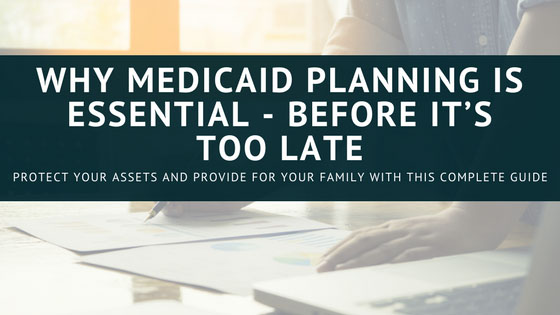Melbourne Medicaid Planning
Protect your assets and provide for your family with this complete guide
by Marshal McDonald
If you remember Aesop’s fable of the ant and the grasshopper, you remember that the ant labors away diligently while the grasshopper frolic’s in the grass.
“Why are you working so hard?” asks the grasshopper. “We have food now, there’s nothing to worry about.” The ant replies that winter is coming and that without storing lots of food, this winter could be his last. Indeed, when it gets cold and the grass wilts, the grasshopper is left out in the cold and the ant returns to his well-stocked hive to wait it out.
Since you’re reading this, you must be the hard working and responsible type. It’s been a life spent looking to the future, building for retirement and paying the mortgage. You’re no stranger to labor – but what happens to us if we can no longer work? What if you or a loved one suffers a stroke and needs a nursing home? How are we to prepare for the later years when we’re not able to earn like we once were?
Fortunately, Medicaid does provide nursing home coverage for the twilight years. But at a steep price. In order to qualify for long-term care, you must surrender practically all of your assets and savings. This means exhausting savings, deflating any hopes of supporting your family, and surrendering financial freedom. How best to secure your hard-earned investments and look out for your loved ones?
Medicaid planning is the only responsible means of protecting choice assets from being liquidated to pay for nursing home care. But beware: certain restrictions apply. If you’re not careful, you could end up losing valuable assets and costing your loved ones more than they’d save. Getting started now is the surefire way to secure your earnings.
This article will explain everything you need to know about Medicaid planning. From why it’s crucial to when to get started, read on to learn precisely how to safeguard your most sizable assets. We’ll discuss exactly how to meet the state Medicaid requirements while sheltering your assets for loved ones and for later use.
By the end of this article, you’ll understand what’s needed the Medicaid planning strategies to create an ideal financial arrangement when approaching Medicaid – even under the worst possible scenarios.
Why Do You Need Medicaid Planning?

Simply, because things often don’t go as planned. According to the Centers for Medicare and Medicaid Services, the majority of US adults will need long-term care in their lifetime. 40 percent will need a period of care in a nursing. Unfortunately, nursing home costs are increasing every day. Medicaid nursing home planning can help provide a safety net for those in need but it’s anything but free.
Ideally, financial planning for long-term care should occur long before the need arises.”
— Wendy Boglioli, Genworth Financial
Medicaid is a joint federal and state program which provides medical assistance to low-income individuals, such as the aged, blind, and disabled. Paying for almost half of all nursing home bills nationwide, Medicaid is the largest source of financing for long-term care. It is the safety net for those without the means to finance long-term care.
State and federal requirements differ, but most states require nursing home residents to spend nearly all of their assets to qualify. In order to receive Medicaid coverage, an individual may possess no more than $2,000 in cash and cash equivalents, such as bonds and IRAS. If you’re married, a higher asset allowance is permitted so long as a spouse remains at home.
The average cost of nursing home care ranges from $81,000 to $90,500 annually, depending if the room is shared or private. Geographic areas such as California and the Northeast are considerably more expensive. At an average of $228 – $248 per day, nursing home costs can wipe out savings in no time at all.
How Does Medicaid Planning Help?
Medicaid planning enables you to exempt – or protect from counting – certain sizable assets and a certain amount of income. With Medicaid planning, you can meet your state requirements and make certain assets and income unavailable to the government. For example, you’ll be able to preserve assets for your loved ones, protect countable assets, and provide for your spouse. All while satisfying your state’s requirements.
Let’s look at three specific ways Medicaid planning can protect you:
#1 Exchange countable assets for exempt assets
Medicaid eligibility is determined by the sum of your countable assets plus your countable income. Assets are countable because they are not exempted by state law, so they are accessible to the state when evaluating for Medicaid payments. On the other hand, exempt assets cannot be tapped for Medicaid payments.
Defined by each state, exempt assets typically include:
- The family home
- One automobile
- Term life insurance
- Prepaid burial arrangements
Medicaid asset/ protection planning enables you to maneuver your finances so that countable assets become exempt assets. For example, countable income could be arranged to pay your mortgage, decrease debts, purchase a car for a healthy spouse, purchase a burial plot, or improve the quality of your home. Instead of spending your savings and retirement funds on paying for the nursing home, Medicaid planning makes them available to increase the value of your inaccessible holdings.
That’s not all.
#2 Establish an irrevocable trust

In order to guarantee something to your loved ones, use an irrevocable trust. Since these terms can’t be changed later, property shielded within this asset-protection trust is exempt from your Medicaid financial review and totally inaccessible. This way, you can shelter your assets and continue to live in-home and review income, though not principal, from the trust.
By naming a beneficiary of the trust, any principal deposited will be secured from the state and available to heirs. As we’ll cover soon, this trust must be established for a certain period of time prior to applying for Medicaid coverage, or it will be ineffective.
“This type of trust enables a person or couple to transfer some type of property, such as a home or cash-like assets, to another person to hold and manage for their benefit…This is not a do-it-yourself project, however.” — Gabriel Heiser, author of How to Protect Your Family’s Assets from Devastating Nursing Home Costs
#3 Use an annuity to provide for your healthy spouse

When your Medicaid eligibility is under consideration, the state looks at you and your spouse’s pooled assets. The healthy spouse may keep one-half of the assets, or what’s called a healthy spouse resource allowance. Oftentimes, this isn’t much to live on. Medicaid planning better helps provide for your spouse.
Your healthy spouse may purchase a single immediate annuity for him or herself from your pooled assets. This converts countable assets into individual incomes, so each partner may retain their own income instead of pooling income. The benefit of the immediate annuity is that the Medicaid applicant more easily qualifies for coverage, and the healthy partner enjoys and retains more assets. By splitting assets into annuities, Medicaid planning ensures a higher quality of life for healthy spouses.
I can’t emphasize this enough.
Risks of Medicaid Planning to Avoid

Medicaid planning requires some finesse. Following 2005’s Deficit Reduction Act, restrictions surrounding Medicaid planning have tightened. Expert Medicaid lawyers are vital when developing strategies to help you retain assets while sustaining long-term care.
The government doesn’t want to pay Medicaid for those sheltering assets that might pay medical bills. After you apply, there’s a review period in which the state looks at finances, assets, and transfers for countable assets. This “look back” period is now five years instead of three. If you give away property or countable assets within this five-year “look back” period preceding the Medicaid application – or transfer assets at less than a fair market value – you’ll be penalized and therefore ineligible for government aid.
The penalty period is determined by the amount given away divided by the average cost of nursing-home care in your region. For example, if you gift $50,000 to your family and the average cost of nursing home care is $5,000 a month in your area, you will be unable to qualify for Medicaid for ten months.
Any penalty periods will begin the day you apply for Medicaid. This leaves you in the awkward position of having exhausted your finances to qualify, yet not achieving coverage for months to come. Family members will have to cover your nursing home bills until your penalty period ends and qualify for Medicaid. Not much of a gift.
People often mistakenly believe that Medicaid has an annual gift-giving exclusion similar to that of the IRS. Unfortunately, that is not the case. Annual tax-free gifts of up to $14,000, if made during the look-back period, would generally be penalized by Medicaid.
Medicaid presumes that the gifts were made for the purpose of qualifying for Medicaid benefits. This presumption can be rebutted if you can show that the gifts were made for other reasons, such as general estate planning purposes. In order to do this, you would have to prove that the gifts were a continuation of a gifting pattern which started before your father became ill.” — Bernard Krooks, The New York Daily News
Bottom line.
Medicaid planning is more effective in some states than others. Certain states will seek reimbursement from your estate after you die, or place a lien on your property when still alive. Consult your experienced Medicaid lawyer to be sure where you stand.
The Last Words
Medicaid planning allows you and your loved ones to live more securely despite nursing home costs. Qualifying for nursing home coverage exhausts your finances. But certain strategies are available to protect key assets against losing your house, car, and the ability to provide for your loved ones. Amidst such a complicated process where thousands of dollars are at stake, an expert Medicaid lawyer makes the difference between sustaining huge losses or securing a quality livelihood for your loved ones. After a life of hard work, it’s the least you deserve.
Source Here
Book an appointment online now!
Learn more about Medicaid Planning Here


